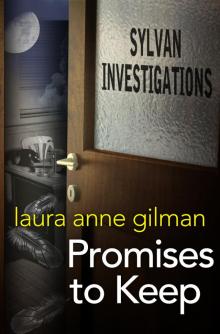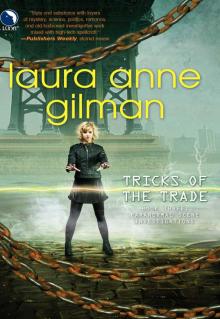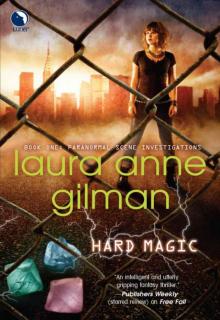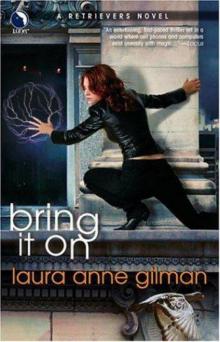- Home
- Laura Anne Gilman
Bring It On Page 2
Bring It On Read online
Page 2
The Talents who had drafted this document weren’t calling it that, of course—they fell back, as Talents tended to do, on historical precedent, and called it a—she checked to make sure she had the wording correct—“a petition to address the grievances of,” etc., etc.
This wasn’t exactly unexpected, even if it was annoying. Fatae were blaming all humans for the attacks on their kind. Lonejacks were blaming the Council for Talents who had gone missing, or were otherwise assaulted. There was just enough truth in all their suspicions to make violence in return seem like a logical response.
Wren didn’t know who the Mage Council was blaming for what, but she was pretty sure it was someone, for something.
“Am I the last sane person left in this city? Don’t answer that,” she warned the demon. “A petition to the Council—Jesus wept. All right, all right. I don’t know what they think this is going to do, but…” She made a few final additions in the margin with a red ballpoint pen, and then signed her initials next to them in a small, neat hand. She wasn’t ready to sign onto this version, not yet. But if they made those changes, moderated the paranoia, asked for specific things rather than a blanket admission of guilt that hadn’t been proven yet…
“Take this back. Tell them to…don’t tell them anything, just give it back to them.” She caught a glimpse of the small, battery-operated clock on the far wall. Almost 4:00 p.m. “And scoot. I have a client coming.”
“Here?”
“Yes, here.” She picked up the courier’s bag from where he had dropped it, and handed it back to the demon, giving him clear indication that this conversation was over. He looked as though he might argue, but simply sighed and took the bag from her. Dropping the paperwork into the internal pocket, he slung it back over his shoulder.
“Go. Get paid. Go home. And next time you have to deliver anything here,” she said as he crawled back out the small kitchen window onto the fire escape, “bring your own damn lunch. Or at least clean up after yourself!”
The mess actually wasn’t too bad; P.B. was a mooch, but not a slob. Wren had managed to give the entire kitchen a wipe-down, throw the dark green coverlet over her bed—covering night-rumpled sheets—and straighten the books and papers in her office before the client was actually due to arrive. Not that the client should be seeing either bedroom or office, but her mother’s training seemed to kick in at the most inconvenient times. God forbid someone should be in the house when a bed was unmade.
The buzzer rang before she could start to contemplate the state of the kitchen floor, all five square feet of it.
“Is this…do I have the right address?”
The voice on the other side of the intercom was female. Attractively nuanced. Young. Educated, but not hoity-toity, to use one of her mother’s most annoying phrases. You could tell the difference, if you listened. People gave so much away in their voices, you could close your eyes and see their emotions in the tenor of their throat. And that had nothing whatsoever to do with current.
Wren waited.
“Is this The Wren?” The voice was coming as though from farther away than street level. “It’s Anna Rosen. We spoke yesterday?”
Upstairs, Wren leaned against the wall, pressing her forehead against the cool plaster as though to ward away the headache that had kicked in the moment the buzzer sounded. Bad sign. Very, very bad sign.
Finally her hand came up and—despite the headache, despite the forebodings—hit the door buzzer, letting the client in.
The intercom was new. Or rather, not new, but newly working. Sergei had hired an electrician to come in and fix it after years of waiting for the landlord to do something, paying triple-time to get it done over Labor Day weekend, and making her promise to use it. No matter who she knew was coming, no matter how silly it made her feel.
The fact that the first time anyone used it was a potential client, a potential client that she was meeting behind his back and without his knowledge, wasn’t something she was willing to think about, yet. Maybe not ever.
She hadn’t had a secret—a real secret—from Sergei since she was twenty-four.
Rosen took the stairs at a decent pace, and wasn’t breathing heavily when she stood in front of the apartment door. Wren gave her points for that, then promptly took those points away when she saw the ridiculously expensive and useless shoes the client was wearing. Still, if she could afford those, she could afford Wren’s fees. And then some. Well-heeled, you betcha.
Young, maybe midtwenties. Long, naturally blond hair pulled back into a thick braid, classic Princess WASP features enhanced by just the right amount of cosmetics, darkening the blond eyebrows and enhancing the pale peach mouth to be noticeable but not stand out. Everything about the girl said Money—but her dark green eyes were sharp, and showed a wry understanding of where she was and what she was doing.
Hiring a Retriever.
“You’re…The Wren?”
“None other.” And she didn’t offer any more information than that. Within certain ever-expanding circles, her identity was well-known, but for various reasons she preferred to go by the nickname she worked under.
And you screw all secrecy-for-a-reason by inviting her to meet here? In your home?
Shut up, she told the voice, and focused her attention outward, honing herself into a version of Sergei’s “All Business, All The Time” persona, as best she could. Beside. Wasn’t as though the Council didn’t know where she lived. The Silence, too. And pretty much every fatae in the city, since this summer and Lee’s wake, which she still sometimes had nightmares about. Might as well just put a sign over her door: Wren Valere, Available Here.
Focus, Valere.
Miss Rosen’s peach mouth quirked into a smile that showed perfect, perfectly white teeth and meant absolutely nothing. Wren returned the same, aware that her own beige features—brown hair, brown eyes, and pale beige skin—never made that much of an impression. Curse and a blessing: if asked by anyone Official, this Anna Rosen wouldn’t be able to remember anything about Wren that could be used to identify her. She hoped.
“Come in,” Wren said, opening the door all the way.
The apartment was large by Manhattan standards—three tiny shoebox bedrooms off a narrow hallway, a kitchenette to the right, and one large main room to the left of the front door—but it was almost painfully bare of furniture. Despite living there for dog years, Wren had never really had the time to think about buying chairs. Or a sofa. Or putting anything on the landlord-white walls.
Clients never, but never saw her home. She had lived here a year, in fact, before anyone other than her mother and Sergei walked through the door. There had been more people in this space in the past four months than in all the time previous, and Wren hated it. But it also made her look around and notice that her nest was missing a few items most folk would consider essentials. Like, oh, furniture.
Given the choice of using the two narrow and more than a little beat-up chairs in the kitchen for this meeting, or sitting on the floor, Wren had finally broken down and, after confirming the appointment, bought a small wooden table and two reasonably comfortable wooden chairs to go with it from a secondhand junk/antique dealer a few blocks away. Those, and the over-stuffed upholstered chair that had seen better decades, were still the only pieces of furniture in the main room, other than the stereo system set against the far wall, and two extremely expensive speakers in either corner.
Maybe the client would think that she rented the place. That would work, yeah.
“Nice system. Acoustics must rock.”
Rosen looked to be in her midtwenties, but she spoke younger. Twenty-three, according to the dossier Wren had put together after the initial contact. Not as complete as what Sergei could have done, but she’d done all right, if she did say so herself.
“Anna Rosen. Born in Glendale, raised in Madison, went to school in Boston, came home to work at the law firm of which Daddy was a partner two years ago, just before his death of a heart attack.
” There. Taking control of the meeting. Establishing herself as the person with the knowledge.
“Alleged heart attack.” Rosen took the left-hand chair and sat down without being asked, placing her oxblood briefcase by her expensive shoes and resting her well-manicured hands on the table surface. “He was murdered.”
Wren stood in the doorway and looked at the client. “I don’t do murders.”
Not intentionally, anyway. Not by name, as such. Only the dead never seemed to stay properly, quietly dead, around her.
“Not asking you to.” Rosen looked at Wren directly, then; the humor in her eyes was muted by pain that hadn’t had the chance to scab yet. The death hadn’t been that recent; she was carrying around some significant emotional issues, then. “I’m Null, not stupid.”
Wren opened her mouth, then snapped it shut. There wasn’t anything she could say at this point that wouldn’t come out all wrong, anyway, even if the girl had been looking for soothing platitudes.
Null meant a human without any Talent, without the ability to channel current, or magic. Almost half of her jobs came from the Null world. They hired her as a thief, not a Retriever, but that was a distinction without a difference to most people. In fact, it probably only meant something significant to another Retriever, and there were only a dozen or so in the world, as far as Wren knew.
The fact that this Miss Rosen used the word Null with such casualness meant that she was aware of Talents, by reputation if not personally. Interesting. Possibly totally irrelevant, but interesting. Wren filed that fact away for later contemplation.
The fact that the client had contacted her directly in the first place might be a little more telling—people who heard about her via the Talent gossip networks usually knew to approach Sergei, first.
She was starting to get too well-known. She’d been too high profile, lately. A good Retriever wasn’t in the spotlight. A good Retriever—a successful Retriever—needed to be invisible, known only for her actions, not herself. Wren wasn’t much for game-playing; she left that to Sergei. Except here she was, playing games, inviting clients into her home, buying furniture that didn’t suit her…
“Let me get directly to the point,” Miss Rosen said, crossing her legs in a ladylike fashion, the sheen of her shoes expensively muted.
Thank God, Wren thought, forcing herself to gather her scattered thoughts and pay attention to what was going on in the here and now. Focus! Don’t screw the pooch so early in the game, Valere! Damn it, she wasn’t a negotiator. She didn’t even like to debate. Her thoughts scattered again like butterflies in the wind. Why had she agreed to meet with this chick anyway, instead of handing it over to Sergei the moment the nibble came in? This was his job, his part of the partnership, to deal with the prejob details.
But the call had come directly to her, and she had taken it on directly. So there wasn’t any Sergei here to fall back on. Her choice, so hers to deal with. Grow up, she heard P.B. say again.
“My father was killed last year. His will entered probate.” Rosen spoke without emotion in that lovely voice, as though all that had happened to someone else. “Now his widow is claiming that a particular piece of jewelry is hers, not mine. It belonged to my mother, and she has no claim to it.”
There was more emotion in the last sentence than the girl had shown, total, up until then. Whatever the piece was, it meant a lot to her. And she really, really didn’t like her stepmother. Did she suspect the woman in her father’s murder? Not your problem, Valere.
Not Wren’s business, who felt what about who, except as it impacted what she was hired to do. Her business was the job, and only the job. “She has it in her possession?”
Rosen nodded. Apparently, the widow did.
A straight-ahead break-and-grab. Nice, Wren thought to herself. Just what the doctor might have ordered, to keep her mind busy while she waited for the Talent-storm forming overhead to either break or disperse.
“I want to keep this low-key,” the girl went on. “She’s going to know it’s me—there’s no way she can’t know. But without proof, without a way to trace it back to me, she won’t be able to do anything about it. That’s why I came to you.”
“Because I’m a Retriever?”
“Because you’re the best.”
All right, that was a fact Wren wasn’t going to argue; although she could name half a dozen non-Cosa thieves who were at least as good at lifting things, they weren’t always as careful about giving the merchandise back over to the client. It was a highest-bidder market out there, for items without clear ownership and no binding contract.
That was the difference between a Retriever and a thief. Not just current, but good work ethics. A Retriever, once bought, stayed bought.
“I need the best. I also need someone with a connection to magic. Can you, I don’t know, do something so that she knows magic is used? To throw her off my trail?”
Covering her ass. Wren could approve. But she hated having anyone tell her how to do a job. Not even Sergei ever did that. If it called for current, she used it. If it called for the more pragmatic, practical skills she had picked up over the years—lock picking and door-jimmying—then she used those. That was what made her the best, not just an accident of Talent.
Wren didn’t say any of that, however. She avoided sitting in the other chair, feeling more comfortable on her feet. At just over five feet tall and otherwise unmemorable, one of the best ways to keep someone focused on you was to present a moving target. Make them just nervous enough to pay attention.
“I am the best, yeah. I’m also not inexpensive.” Okay, so that wasn’t patented Sergei Didier smooth. She wasn’t Sergei, and she did things her way, damn it. “I’m not going to insult you by suggesting that you can’t afford me, but are you sure that this is going to be worth it?”
“You’re suggesting that I shouldn’t hire you?” Rosen seemed less surprised than amused, like her pet dog had done something cutely annoying.
Wren shrugged. She found it hard to care, one way or another, what this girl did. Fake that sincerity, Wrenlet, she could hear Sergei say in the back of her mind. Clients love to believe you’re giving two hundred percent.
“I hate buyer regrets. Especially when I’m the one getting regretted.”
Whatever Rosen was going to say in response was drowned in the blast that reached the building just as she opened her mouth.
What the hell?
Wren grabbed the girl by the shoulders and had them both flat on the hardwood floor by the time the shock wave hit them completely.
“What the hell?” Rosen echoed Wren’s first thought.
“Shut up.” Every sinew in Wren’s body was trembling, far in excess of what the noise should have caused. She willed herself to stop shaking, but couldn’t do anything about the cold sweat on the back of her neck. Current sizzled inside her, and she wanted, very badly, to throw up from the pain expanding inside her head.
“Something…” The girl was clearly puzzled by the strength of Wren’s reaction, proving that she was, in fact, completely Null. “Something hit us. The building. Was that an earthquake?”
“Not an earthquake,” Wren said, not sure how she knew but knowing, without hesitation. “Not even close.”
That was current. A lot of it. And all of it sent with nasty intent.
2
Nothing in the apartment seemed to be broken, although a stool in the kitchen had fallen over, and Wren didn’t want to think about what her research library, a bedroom in the back of the apartment, toward the front of the building, might look like. Some of those books were old, and expensive, and damned rare, and a lot of them were only on loan from people who would kill her if anything happened to them.
“Stay here.”
“But…” The client looked around, clearly remembering the shock of the explosion, and decided that obedience was the smarter move right now, no matter how unfamiliar the sensation might be. Walking cautiously down the hallway, as though an additio
nal attack might come at any second, Wren did a once-over of the rest of the apartment.
Amazingly not only were all the books still on the shelves in the first bedroom, but nothing had even slid off the desk in the second room, which served as her office—and when she booted up her computer, holding her breath and mentally reciting prayers to whatever saints she could recall, it came up without a hitch.
“Oh thank you, God.” If that blast hadn’t been current-shaped, she’d hand in her lonejack ID. Somehow, though, it hadn’t done what current typically did, which was fry every bit of electronics in the vicinity.
Wren didn’t know why she had been spared; she was just thankful.
There was no dial tone on the phone when she first picked it up, but as she held it, thinking that maybe she had given thanks too soon, the tone came back.
“Well, that’s a switch,” she said in mild surprise. Typically things broke when she held them, not the other way around and getting fixed. Putting the receiver down before it changed its mechanical mind, Wren reached over to shut down the computer. Other people might have the luxury of leaving their system up and running all the time, but not Talents. Not even in this seemingly super-insulated building, bless its pre-War, plaster-coated walls.
Giving the room another quick once-over to make sure that nothing had moved since she came in, Wren went into the third and smallest room, the one she used as a bedroom. Her wind-up alarm clock had stopped ten minutes ago, and the water glass on her nightstand had cracked, but thankfully she had downed the last of the water in it that morning.
This room seemed to be less protected. And yet, there was nothing different about it from the first two rooms in terms of construction. In fact, there was nothing at all that should have attracted current—no electronics, no magical implements, no tools of the trade. Not where she slept, where unconsciousness might allow current to slip in or out unguarded.

 West Winds' Fool and Other Stories of the Devil's West
West Winds' Fool and Other Stories of the Devil's West Gabriel's Road
Gabriel's Road Morgain's Revenge
Morgain's Revenge The Shattered Vine
The Shattered Vine Laura Anne Gilman - Tales of the Cosa Nostradamus
Laura Anne Gilman - Tales of the Cosa Nostradamus The Camelot Spell
The Camelot Spell VISITORS
VISITORS Staying Dead
Staying Dead Silver on the Road
Silver on the Road Weight of Stone
Weight of Stone Promises to Keep
Promises to Keep Tricks of the Trade psi-3
Tricks of the Trade psi-3 Blood from Stone
Blood from Stone Soul of Fire tp-2
Soul of Fire tp-2![Pack of Lies [2] Read online](http://i1.bookreadfree.com/i1/04/01/pack_of_lies_2_preview.jpg) Pack of Lies [2]
Pack of Lies [2] Burning Bridges
Burning Bridges The Work of Hunters
The Work of Hunters Miles to Go
Miles to Go Pack of Lies psi-2
Pack of Lies psi-2 Tricks of the Trade
Tricks of the Trade Hard Magic
Hard Magic Bring It On
Bring It On Darkly Human
Darkly Human The Cold Eye
The Cold Eye An Interrupted Cry
An Interrupted Cry Soul of Fire
Soul of Fire Hard Magic psi-1
Hard Magic psi-1 The Shadow Companion
The Shadow Companion Flesh and Fire
Flesh and Fire